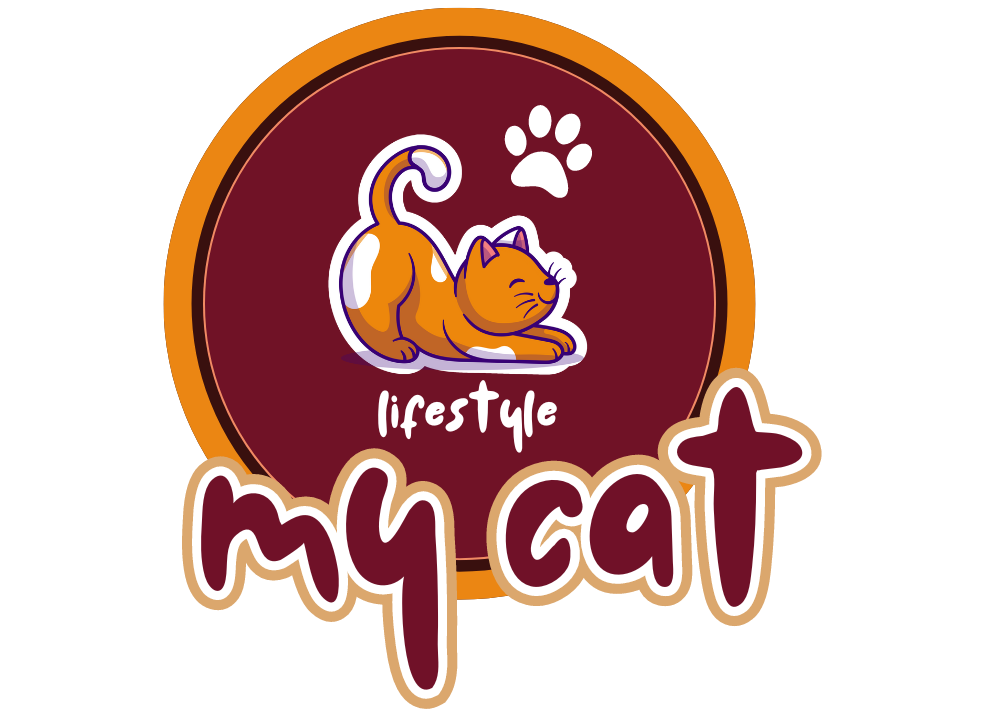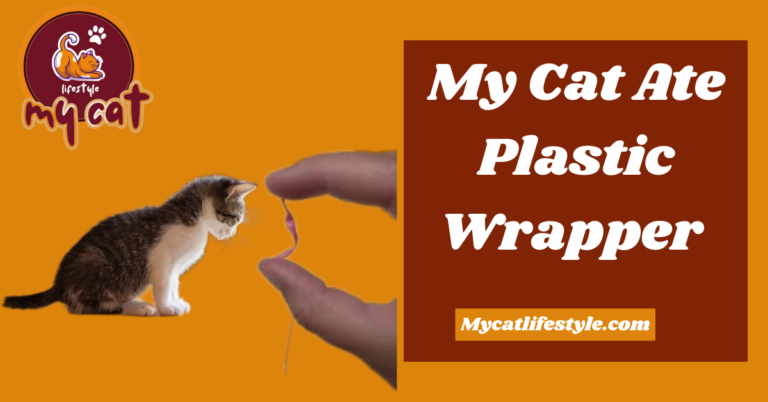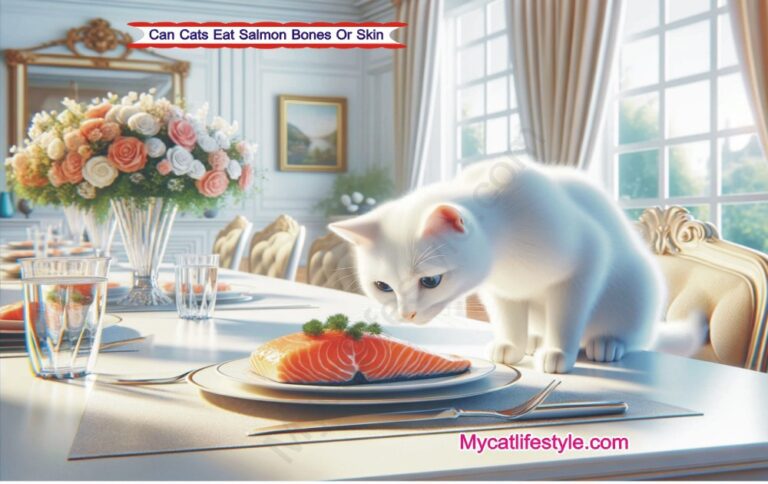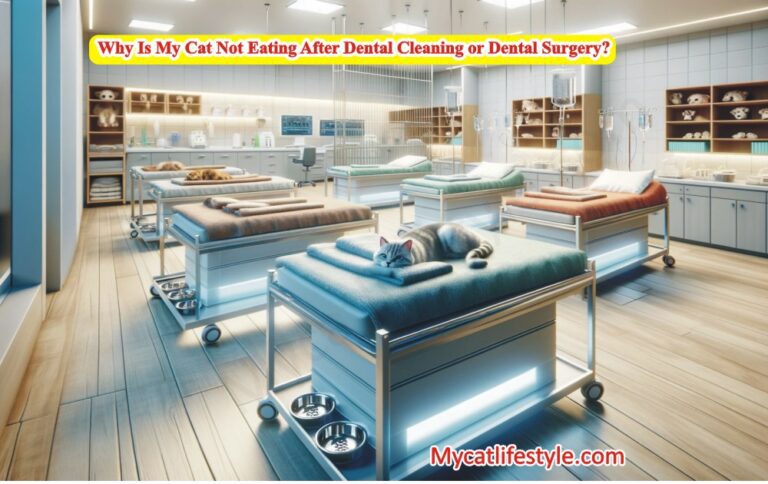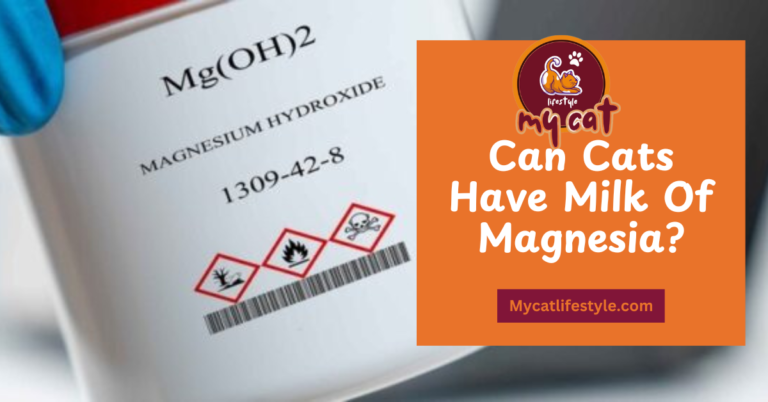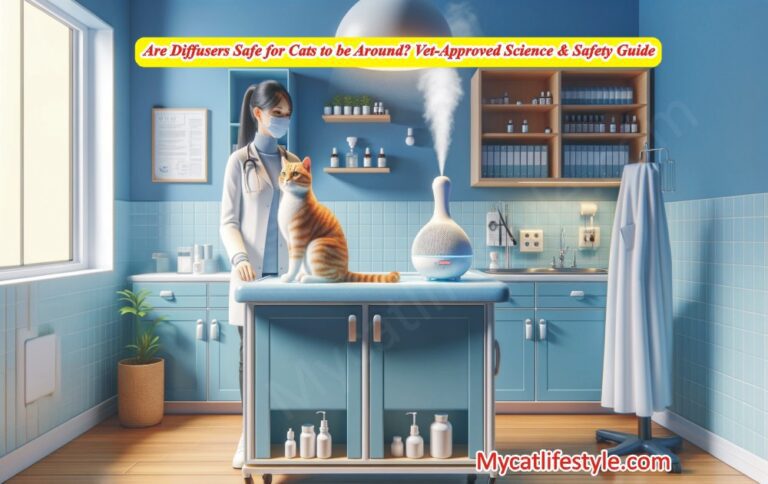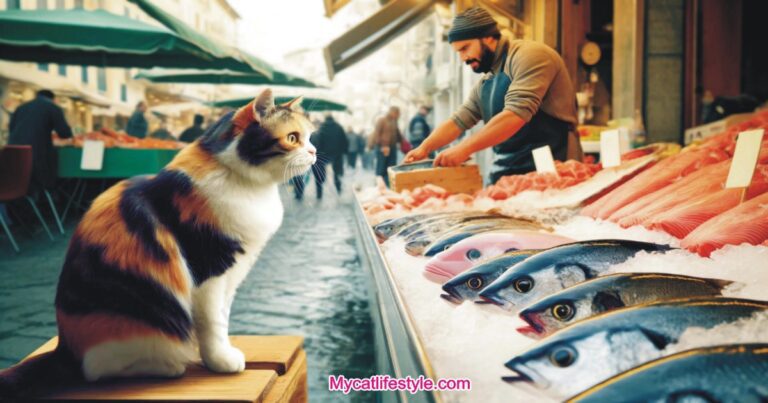Why Is My Cat Not Eating But Is Drinking Water?
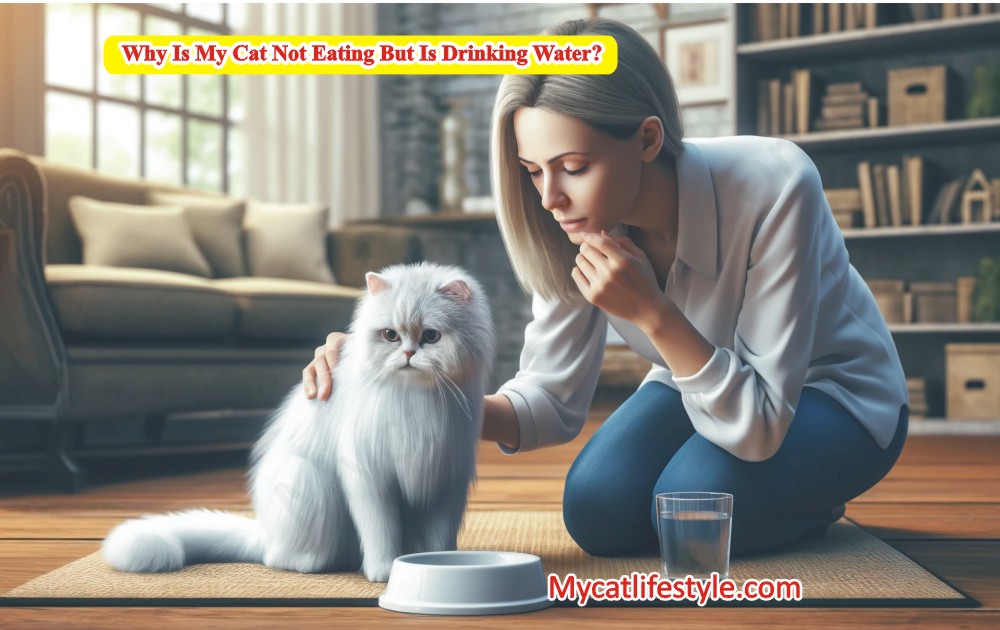
Cats can occasionally go a few days without eating, but if your cat stops eating, it typically indicates a problem. Stay calm, as the issue may be minor and easily resolved. However, if your cat hasn’t eaten for 24 hours, it’s important to consult your veterinarian for advice. Cats should not go longer than three days without adequate water intake, as they can quickly become dehydrated.
If you notice that your cat is drinking more water than usual while not eating, this could be a sign of a more serious condition such as diabetes or kidney problems, which are more common in older cats. In such cases, it’s crucial to have your veterinarian evaluate your cat to diagnose any underlying health issues.

Why Is My Cat Not Eating But Is Drinking Water?
Cats are adept at concealing illnesses, often not showing signs until the symptoms become noticeable. There are various reasons why your cat might stop eating but continue to drink water, ranging from simple issues that are easily resolved to more serious conditions that require a veterinarian’s attention.
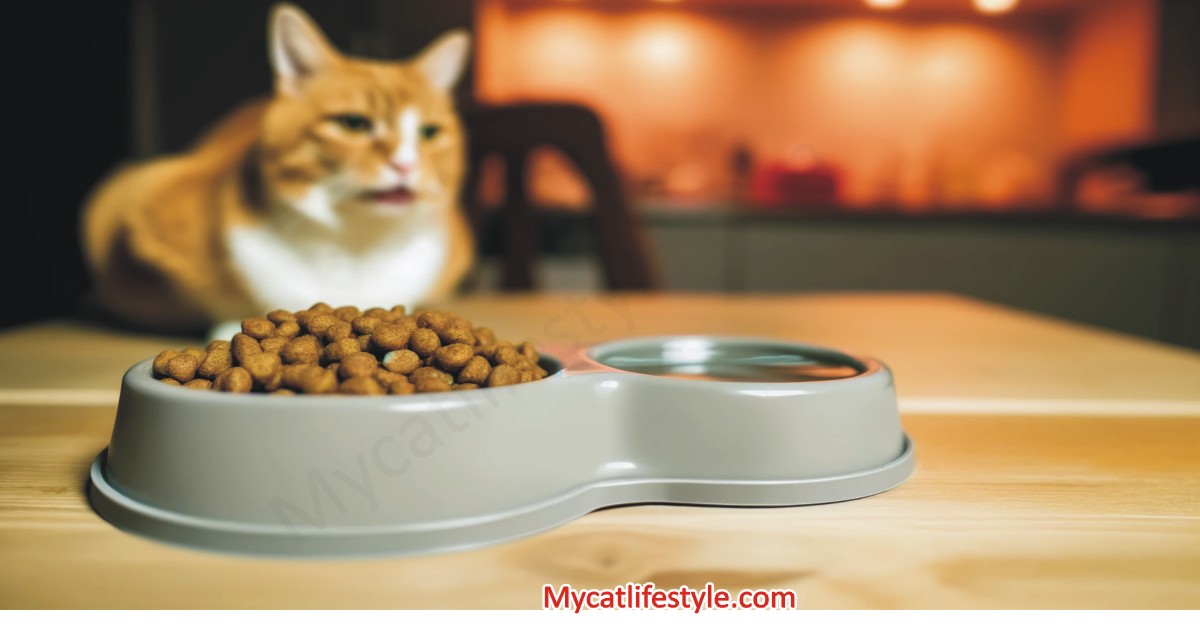
Problems with Food Types and Textures
I have six cats, each with distinct preferences for what they will and won’t eat, including specific textures. For example, some cats might reject fish in favor of chicken or prefer pâté over chunks or shreds. Understanding and accommodating your cat’s preferences can often resolve feeding issues.
An Illness or Terminal Condition
Health issues are a common reason for a cat’s lack of appetite. It’s important to monitor your cat closely and consult your veterinarian if your cat refuses food for more than 24 hours. Early intervention with a suitable treatment plan can help your cat recover more quickly.
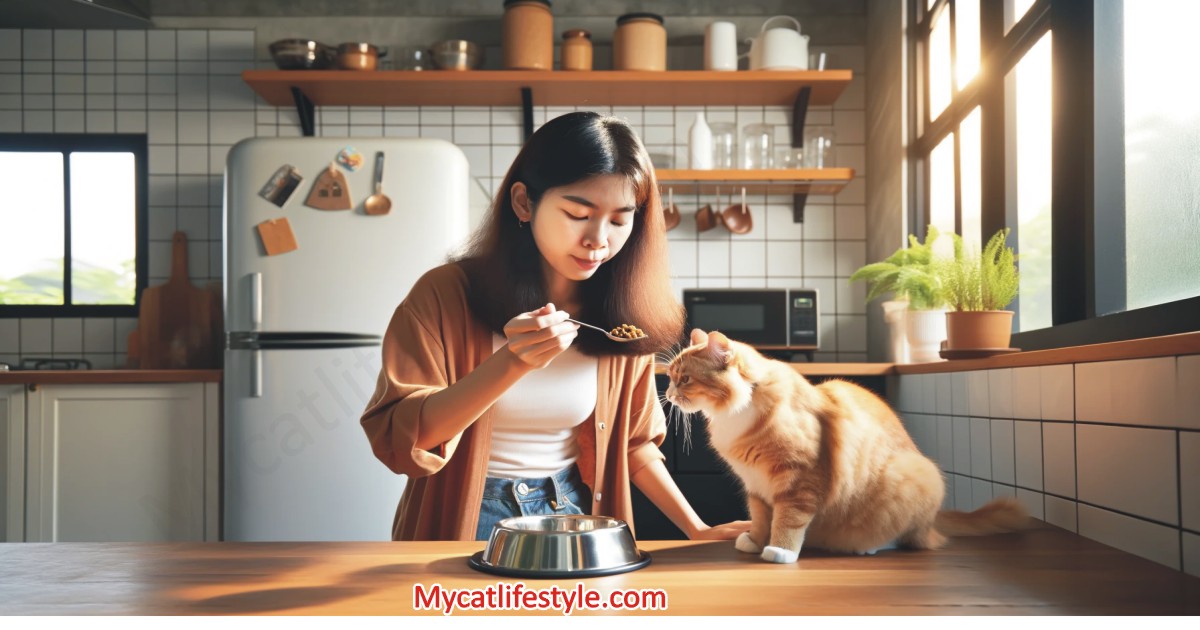
Dental Issues
Cats can suffer from a variety of dental problems such as cavities, rotten teeth, mouth infections, inflamed gums, abscessed teeth, broken teeth, oral tumors, and other inflammatory conditions that require veterinary care.
Gastrointestinal and Other Health Issues
Cats may also experience:
• Gastrointestinal problems such as stomach inflammation, irritable bowel syndrome (IBS), parasites, colitis, or cancer.
• Kidney disease, infections, urinary tract issues, and pancreatic problems.
• Side effects from vaccinations and medications.
• Behavioral issues like anxiety, depression, and stress.
• Dietary issues including new or spoiled foods, metabolic disorders, and seasonal changes.
Although some experts suggest cats can survive up to two weeks without food, such deprivation can quickly lead to significant weight loss and health deterioration due to their small size. If your cat refuses to eat for over 24 hours, it’s critical to consult your veterinarian. In my experience, when a cat is unwell, I offer anything palatable—like water-packed tuna, baked chicken, or freshly cooked fish that’s free of bones—to encourage eating, avoiding seasoned human food that might be harmful.
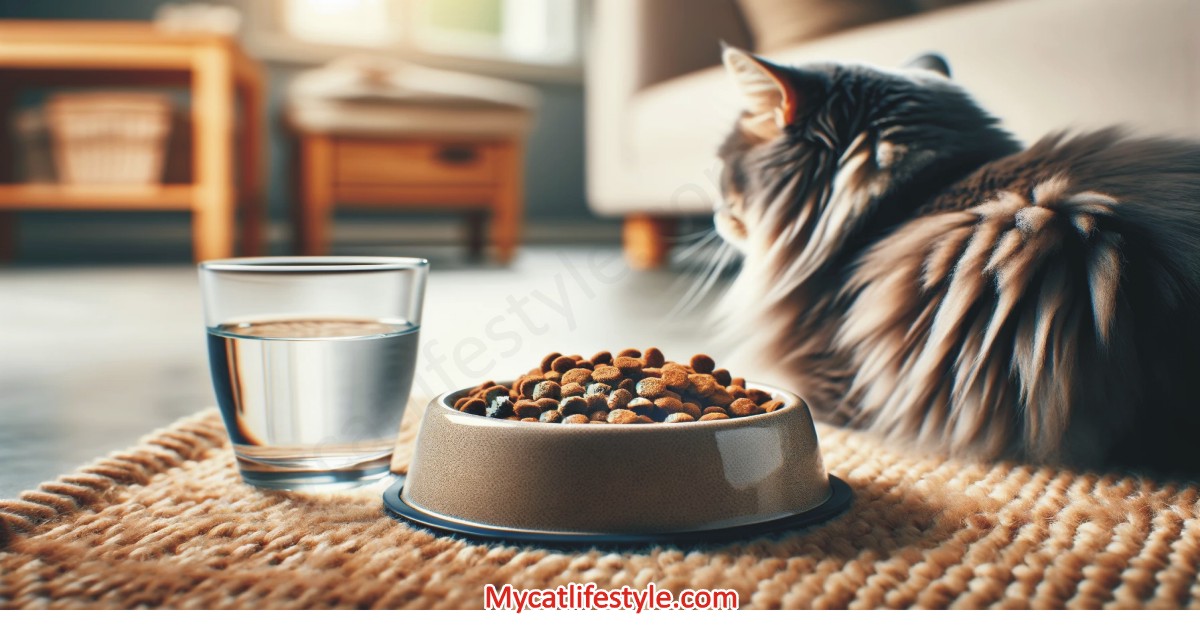
How Do I Get My Cat to Eat?
Once your veterinarian identifies and treats the underlying reason your cat isn’t eating, you should see an improvement in their appetite. However, if your cat is medically healthy and your vet has ruled out health issues, it’s time to play detective and explore other reasons why your cat might not be eating. Your vet may also offer some helpful advice. Here are some tips to encourage your cat to start eating:
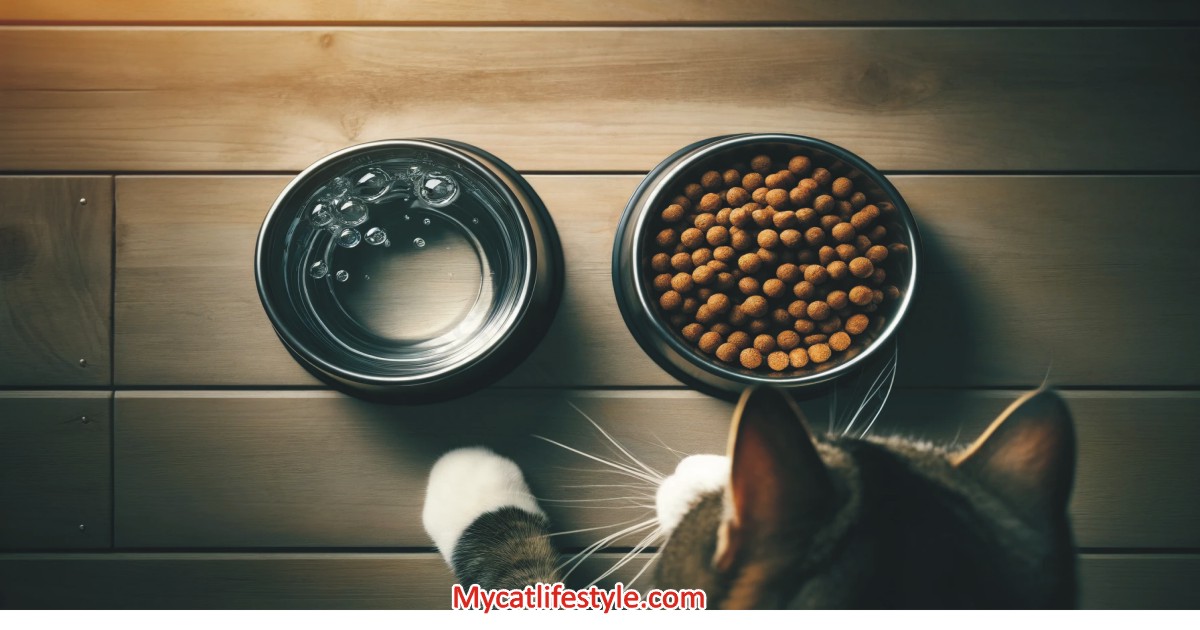
Understand Your Cat’s Preferences
Experiment to find out what types of food and textures your cat prefers. Avoid purchasing large quantities of food until you’re sure of your cat’s likes and dislikes.
Food and Bowl Preferences
Determine whether your cat likes dry food, wet food, or a mix of both. Also, some cats may refuse to eat from plastic bowls, preferring glass or metal. Additionally, consider the shape of the dish; some cats prefer flat plates to bowls to avoid whisker fatigue.
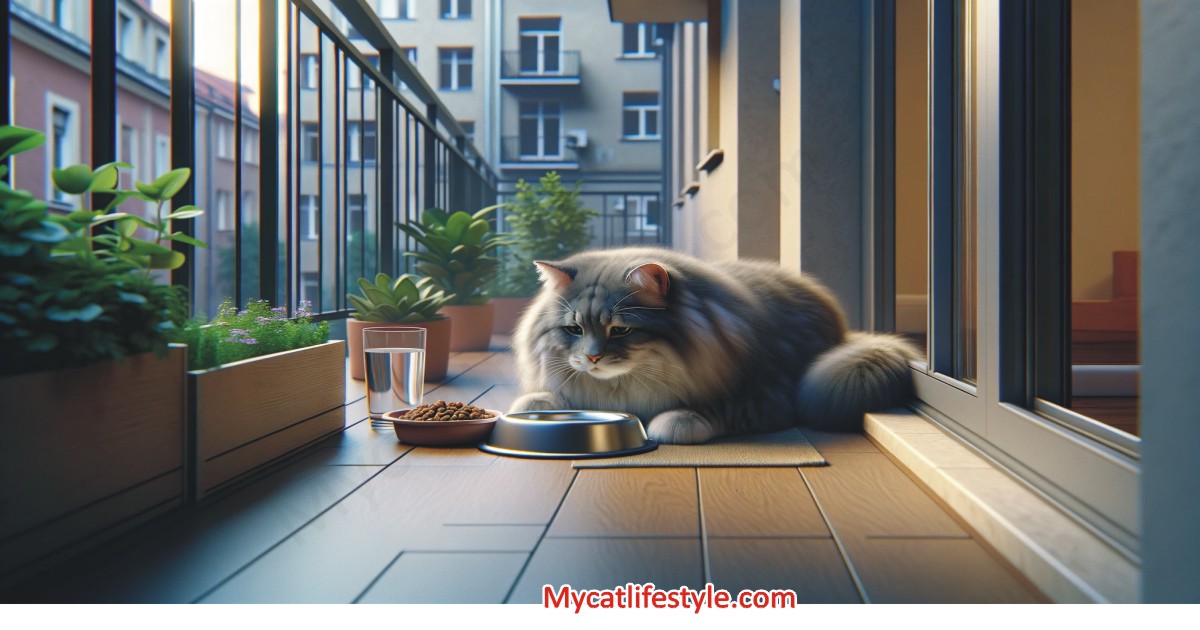
Mealtime Environment
Cats often prefer a calm and quiet environment during meals. They may not eat if there’s too much noise or activity, or if other pets are too close.
Entice with Tuna
Occasionally offering tuna can entice a cat to eat. However, it should be given sparingly as a treat, not a meal replacement.
Try Baby Food
Plain baby food (make sure it’s free of garlic, onion, and excessive seasoning) can be appealing to cats.
Serve Food at the Right Temperature
Cats typically do not like cold food straight from the refrigerator. Warm the food slightly before serving, but make sure it’s not hot.
Freshness Matters
Many cats refuse to eat wet food that has been left out for too long. Serve fresh meals to encourage eating.
Supplements and Appetite Enhancers
Discuss with your vet the possibility of using vitamin injections, over-the-counter vitamins, or appetite enhancers to help stimulate your cat’s appetite.
These strategies can help pinpoint the cause of your cat’s reluctance to eat and find ways to stimulate their appetite.
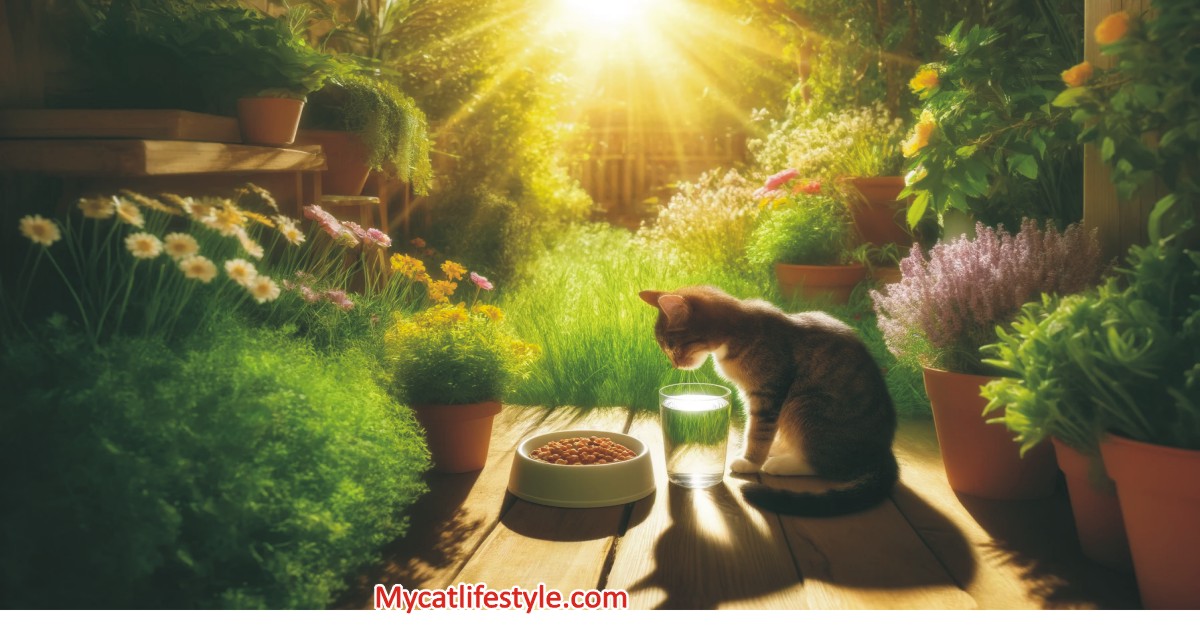
What To Do If My Cat Is Not Eating, But Will Drink?
- Over my three decades as a cat owner, I’ve learned that cats have their reasons for their behaviors. If your cat is drinking but not eating, you have a partial victory, but there’s still an underlying issue that needs addressing, especially if they have passed their physical exam.
Cats can be finicky eaters, but it’s crucial not to let them go more than 24 hours without eating. It’s important to consult your vet promptly because cats can lose weight quickly if they stop eating, which is more critical than in dogs or other animals.
If your cat is under veterinary care for health issues, they should begin to eat again soon, depending on the nature of their condition. Here are some methods I use to encourage eating:
- Entice with Tuna Juice: A teaspoon of tuna juice or commercial cat gravy can help stimulate your cat’s appetite.
- Enhance Their Favorite Food: Try adding some extra gravy or cool water to their preferred food.
- Try Lil’ Soups: These are available at most pet stores and can be appealing to finicky eaters.
- Avoid Starvation: Never starve your cat to force them to eat specific foods, even if it’s a vet-prescribed diet. Consider switching the food brand, type, or consistency if necessary.
- Manual Feeding: In severe cases, feeding your cat with a large feeding syringe mixed with pate and water might be necessary.
- Feeding Tubes: For extremely difficult situations, vets may need to place feeding tubes.
- Table Food Options: Although I generally don’t recommend feeding cats table food, in some cases, offering baked chicken, water-packed tuna, or a boiled egg—without any seasoning—might help.
- Feed Small Amounts: Gradually increase their intake to help build back their appetite without overfeeding.
It’s essential to take gradual steps to help a cat regain its appetite and monitor their food intake to ensure they’re receiving the nutrients they need.
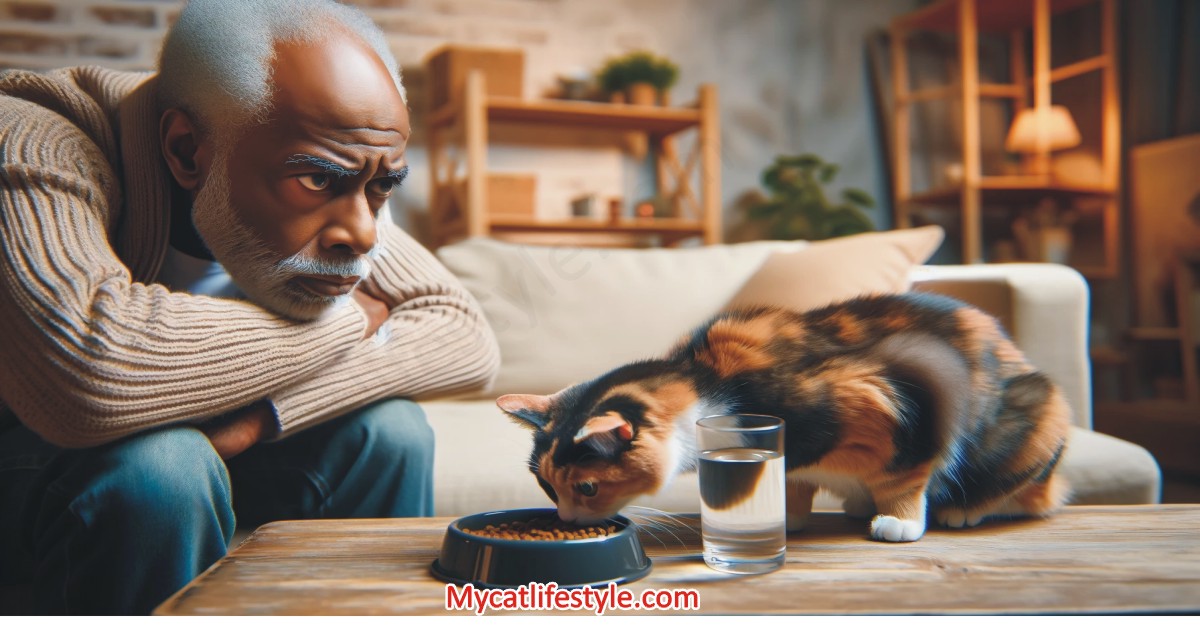
What Causes a Cat to Stop Eating?
When a cat loses its appetite, it’s called “anorexia.” The term “hyporexia” or “inappetence” means the cat is eating less than usual, but often both conditions are just referred to as anorexia. There are several reasons why a cat may not want to eat:
- This could be from eating spoiled food, too many sweets, garbage, or because of a hairball.
- Some cats are just finicky about what they eat.
- Cats might not like a new type of food right away.
- Changes like a new environment, their owner being away, or other shifts in their home life can affect their eating.
- Pain or problems in their mouth that make chewing difficult.
- Pain anywhere in their body can reduce their desire to eat.
- Creatures like roundworms or Giardia can upset a cat’s stomach.
- For example, upper respiratory infections can lead to fever, mouth ulcers, a sore throat, or affect their sense of smell.
- Food allergies, inflammatory bowel disease (IBD), or other issues with the digestive tract.
- Eating something poisonous or swallowing something like a string or toy that blocks their intestines.
- Some medicines can make cats lose their appetite.
- Conditions like kidney disease, liver disease, hyperthyroidism, diabetes, or cancer.
If your cat stops eating, it’s important to consult a veterinarian. They can help figure out the reason and recommend the best way to help your cat start eating again.
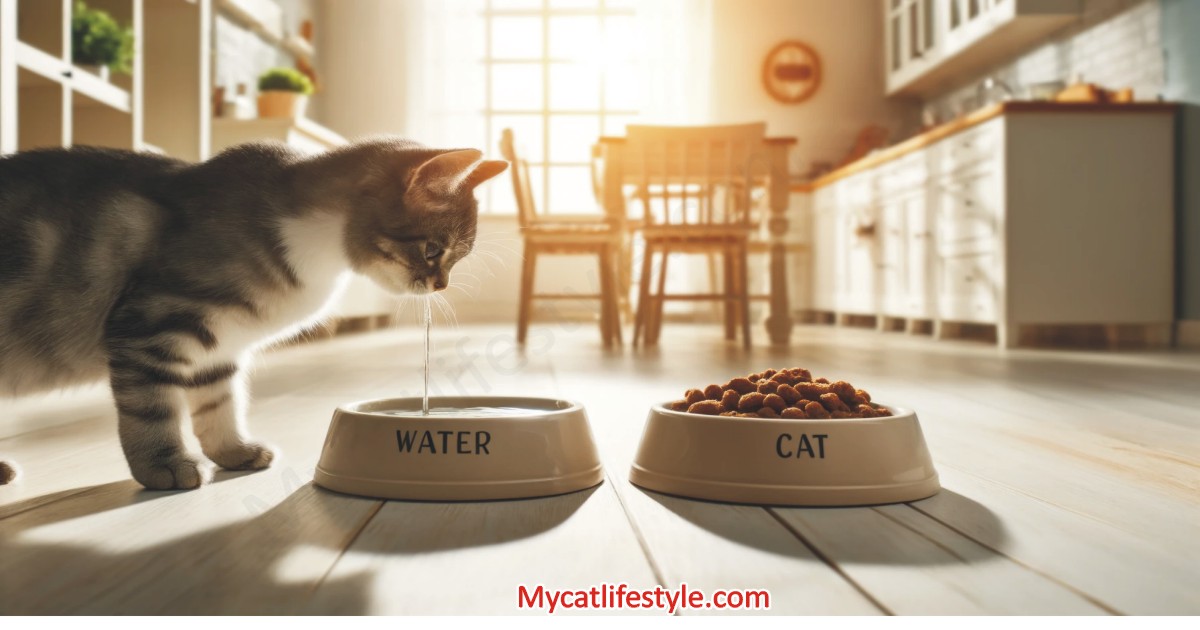
What to Do If Your Cat Isn’t Drinking Water Either
If your cat stops eating and drinking, the risk of dehydration becomes a significant concern, potentially worsening their appetite and overall health. To mitigate this risk, there are several strategies you can employ to encourage your cat to drink more water. Ensure that fresh, clean water is available in various locations throughout your home to accommodate your cat’s preferences for different drinking spots.
Using a wide, clean bowl can also make drinking more appealing and comfortable for your cat. If these measures don’t help, consult your veterinarian about incorporating water into your cat’s wet food to help maintain adequate hydration levels.
What Is the Treatment for a Cat Who’s Not Eating or Drinking?
Treating a cat that is refusing to eat involves two main strategies: addressing the underlying health issue and providing supportive care. It’s crucial to tackle the root cause of the appetite loss to ensure a lasting solution, particularly in cases of chronic illness.
Without addressing this underlying issue, the problem of not eating may recur once supportive care ends.To identify the cause of a cat’s refusal to eat, a veterinarian will gather a comprehensive history, asking about symptoms, any changes in the household, or recent travel.
A physical examination will also be conducted to assess the cat’s overall health and identify any physical signs that might explain the lack of appetite, such as dental problems or a respiratory infection.Diagnostic tests often play a key role in forming a diagnosis, as they provide detailed insights into the cat’s internal health. These tests might include:
- A fecal examination to detect parasites.
- Comprehensive blood tests and urinalysis.
- Imaging studies like X-rays or ultrasound.
- Screening for infectious diseases.
Based on the cat’s history and observed symptoms, further tests such as biopsies or a dietary trial with prescription food may be necessary.Once a diagnosis is made, specific treatments are administered. For instance, a cat with dental issues might need a procedure to remove affected teeth, while a cat stressed by environmental changes might benefit from calming supplements.Supportive care remains a critical component throughout this process, helping to alleviate symptoms, prevent complications from not eating, and facilitate recovery.
Caring for a sick cat involves different types of support depending on what the cat needs. Here are some common ways to help:
- Medications to reduce nausea.
- Medications like antacids to protect the cat’s stomach.
- Medications that help increase the cat’s desire to eat.
- Pain relievers.
- Fluid therapy, which involves giving fluids with balanced electrolytes either under the skin or through an IV.
- Special diets that are easy on the stomach or help with hairball control.
- Techniques to encourage eating, such as:
- Offering soft canned food or a favorite treat.
- Heating food to body temperature to make it smell more appealing.
- Hand feeding the cat while giving it lots of praise and attention.
- In severe cases, the cat may need to be hospitalized and possibly given a feeding tube for long-term nutritional support.
Always consult your veterinarian before giving any medications to your cat, as some can be harmful.
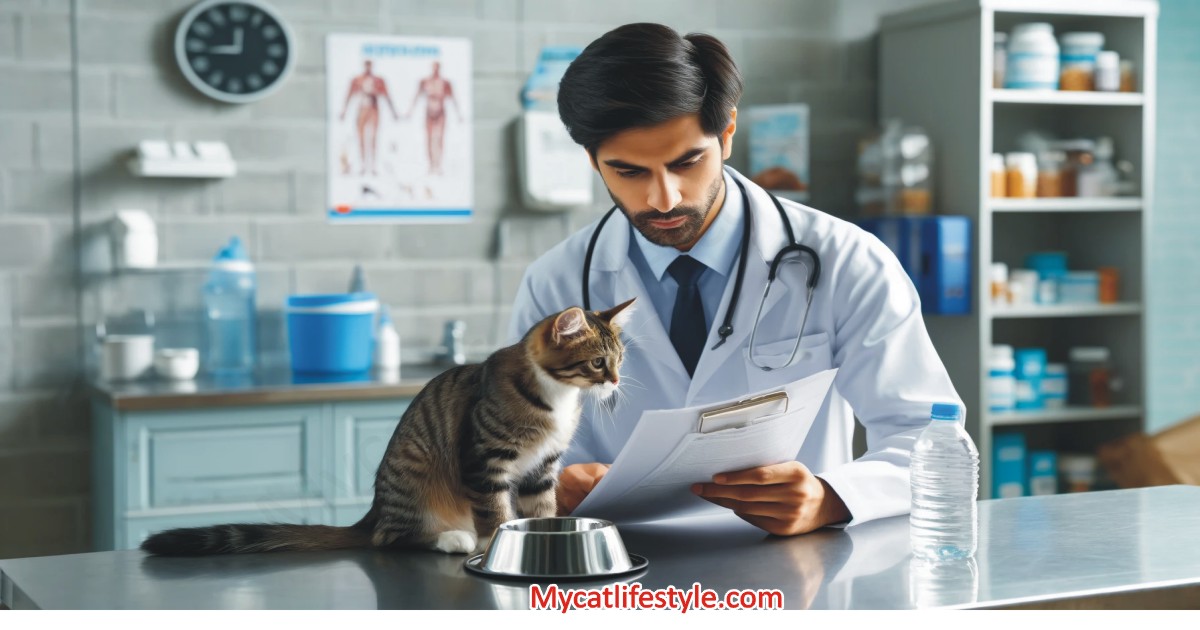
What Do You Do When Your Cat Won’t Eat?
What should you do if your cat stops eating? Whether your cat is a kitten or a senior, if it stops eating, it’s important to act quickly rather than waiting to see if it will eat later. Even if your cat seems normal otherwise, not eating can lead to serious health issues.
Cats that don’t eat for more than a day or two can develop a dangerous condition known as fatty liver, or hepatic lipidosis. This condition occurs when the body starts using stored fat for energy due to the lack of food intake, overwhelming the liver, which has to process this fat. Fatty liver can lead to liver failure and is especially risky for cats that are overweight, though it can affect any cat.
Not eating can also cause other problems like dehydration, electrolyte imbalances, nutrient deficiencies, weight loss, and slower recovery from any illnesses. If your vet finds that there’s no medical reason for your cat’s lack of appetite and thinks it might just be picky eating, they can offer advice on establishing a healthy eating routine. They might suggest trying new types of food, switching from dry to wet food, or adding fish oil or a bit of canned tuna to make meals more appealing. However, it’s important not to depend on human food as a long-term solution since it doesn’t provide all the nutrients cats need.
Regardless of the cause, it’s crucial to talk to your veterinarian immediately to get your cat the best care quickly, preventing any health condition from getting worse.Quick action is also important to help your cat feel better and return to normal as soon as possible.If your cat is not eating or drinking, make sure to book an appointment with your vet. They will address your concerns and may run tests to find out what’s wrong.
Frequently Asking Questions
1. Why is my cat only drinking water but not eating food?
Sometimes, cats may drink water but refuse to eat if they’re feeling unwell. This could be due to a number of reasons such as dental problems, stress, or an upset stomach. If your cat is drinking but not eating, it’s important to monitor them closely and consult a veterinarian if the behavior continues beyond 24 hours.
2. How long can a cat survive without eating but still drinking water?
A cat can survive for a few days without food as long as it is still drinking water, but this is not ideal. Cats that don’t eat for more than 24-48 hours can develop serious health issues, including liver problems. It’s best to contact a vet if your cat hasn’t eaten for more than a day.
3. When should I start to worry if my cat isn’t eating?
You should start to worry if your cat hasn’t eaten anything for 24 hours or more. Lack of appetite can be a sign of various health issues. Other concerning signs include lethargy, vomiting, or changes in behavior. If you notice these symptoms, it’s crucial to consult a veterinarian promptly.
4. What should I do if my cat won’t eat or drink at all?
If your cat stops eating and drinking entirely, it’s a medical emergency. Try offering different types of food, like wet cat food or a little tuna, to see if they might be tempted. However, if your cat still refuses to eat or drink, you should take them to a vet immediately as it could indicate a serious health problem.
Resources
Here are some valuable resources that provide in-depth information about feline health, particularly on issues related to appetite and hydration:
- Association of American Feed Control Officials. Treats and Chews. https://talkspetfood.aafco.org/treatsandchews
- BondVet. Why is My Cat Not Eating or Drinking? https://bondvet.com/b/why-is-my-cat-not-eating-or-drinking
- Cornell University College of Veterinary Medicine. The Special Needs of a Senior Cat. https://www.vet.cornell.edu/departments-centers-and-institutes/cornell-feline-health-center/health-information/feline-health-topics/special-needs-senior-cat
- Cornell University College of Veterinary Medicine. Hyperthyroidism in Cats. https://www.vet.cornell.edu/departments-centers-and-institutes/cornell-feline-health-center/health-information/feline-health-topics/hyperthyroidism-cats
- Cornell University College of Veterinary Medicine. Chronic Kidney Disease. https://www.vet.cornell.edu/departments-centers-and-institutes/cornell-feline-health-center/health-information/feline-health-topics/chronic-kidney-disease
- Cornell University College of Veterinary Medicine. Feline Diabetes https://www.vet.cornell.edu/departments-centers-and-institutes/cornell-feline-health-center/health-information/feline-health-topics/feline-diabetes
These resources are helpful for understanding the complexities of feline health and the specific needs that may arise with various conditions that affect appetite and hydration.
